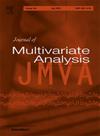Quadratic inference with dense functional responses
IF 1.4
3区 数学
Q2 STATISTICS & PROBABILITY
引用次数: 0
Abstract
We address the challenge of estimation in the context of constant linear effect models with dense functional responses. In this framework, the conditional expectation of the response curve is represented by a linear combination of functional covariates with constant regression parameters. In this paper, we present an alternative solution by employing the quadratic inference approach, a well-established method for analyzing correlated data, to estimate the regression coefficients. Our approach leverages non-parametrically estimated basis functions, eliminating the need for choosing working correlation structures. Furthermore, we demonstrate that our method achieves a parametric -convergence rate, contingent on an appropriate choice of bandwidth. This convergence is observed when the number of repeated measurements per trajectory exceeds a certain threshold, specifically, when it surpasses , with representing the number of trajectories. Additionally, we establish the asymptotic normality of the resulting estimator. The performance of the proposed method is compared with that of existing methods through extensive simulation studies, where our proposed method outperforms. Real data analysis is also conducted to demonstrate the proposed method.
具有密集泛函响应的二次推理
我们解决了在具有密集功能响应的恒定线性效应模型背景下估计的挑战。在此框架中,响应曲线的条件期望由具有恒定回归参数的函数协变量的线性组合表示。在本文中,我们提出了另一种解决方案,即采用二次推理方法来估计回归系数,这是一种成熟的分析相关数据的方法。我们的方法利用非参数估计基函数,消除了选择工作相关结构的需要。此外,我们证明了我们的方法实现了参数n收敛率,取决于适当的带宽选择。当每条轨迹的重复测量次数超过一定阈值时,特别是当它超过na0时,可以观察到这种收敛性,其中n表示轨迹的数量。此外,我们建立了所得估计量的渐近正态性。通过广泛的仿真研究,将所提出方法的性能与现有方法进行了比较,其中我们提出的方法优于现有方法。并通过实际数据分析验证了所提出的方法。
本文章由计算机程序翻译,如有差异,请以英文原文为准。
求助全文
约1分钟内获得全文
求助全文
来源期刊

Journal of Multivariate Analysis
数学-统计学与概率论
CiteScore
2.40
自引率
25.00%
发文量
108
审稿时长
74 days
期刊介绍:
Founded in 1971, the Journal of Multivariate Analysis (JMVA) is the central venue for the publication of new, relevant methodology and particularly innovative applications pertaining to the analysis and interpretation of multidimensional data.
The journal welcomes contributions to all aspects of multivariate data analysis and modeling, including cluster analysis, discriminant analysis, factor analysis, and multidimensional continuous or discrete distribution theory. Topics of current interest include, but are not limited to, inferential aspects of
Copula modeling
Functional data analysis
Graphical modeling
High-dimensional data analysis
Image analysis
Multivariate extreme-value theory
Sparse modeling
Spatial statistics.
 求助内容:
求助内容: 应助结果提醒方式:
应助结果提醒方式:


